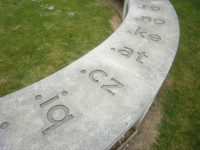Earlier this year, a group of U.S. litigants launched an unusual domain name lawsuit. The group consisted of family members of victims of terror attacks they claim were sponsored by the governments of Iran, Syria, and North Korea. The group had succeeded in winning over a billion dollars in damages in several lawsuits filed in U.S. courts.
Unable to collect, they sued the Internet Corporation for Assigned Names and Numbers (ICANN), the body that administers the Internet’s domain name system. Their goal: seize the dot-ir, dot-sy, and dot-kp domain name extensions (the respective country-code domains) by ordering ICANN to transfer them as compensation.
My weekly technology law column (Toronto Star version, homepage version) notes the notion of seizing a country’s domain name extension may sound implausible, but the case is proceeding through the U.S. court system with ICANN filing a brief late last month. ICANN is unsurprisingly seeking to dismiss the case, arguing that the domain name extensions are not property that is capable of seizure (I am a board member of the Canadian Internet Registration Authority, Canada’s dot-ca administrator, but this article represents my own views and not those of CIRA).







